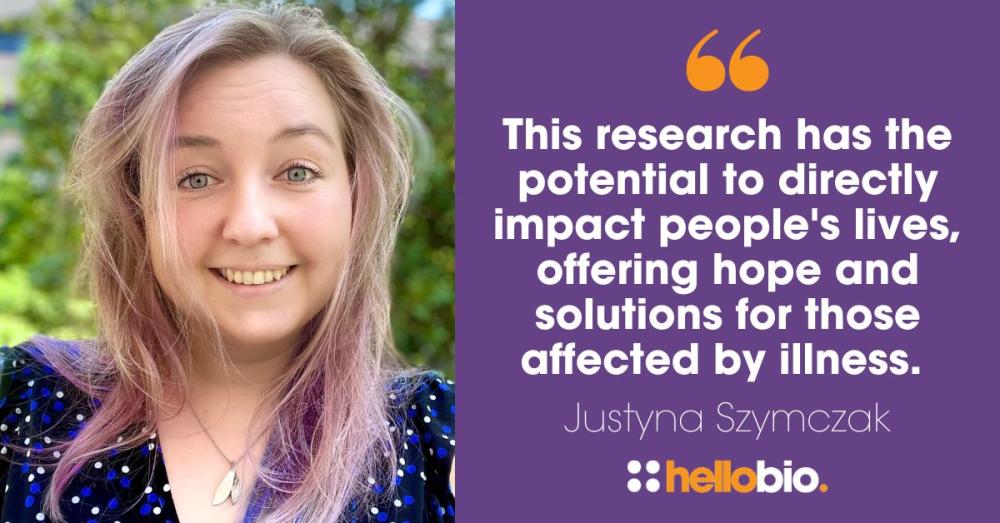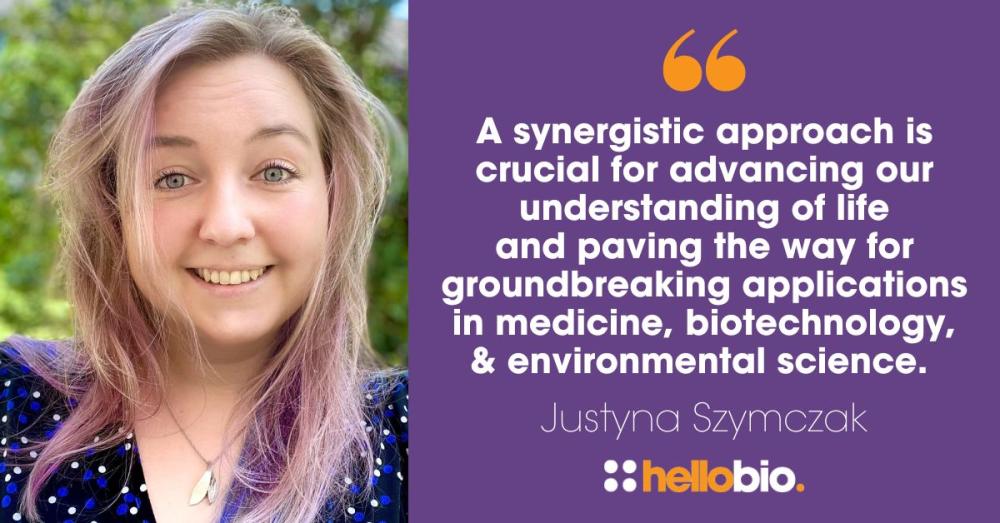Meet our Early Career Scientist Grant Winner Justyna Szymczak
It’s time to introduce the latest winner of our monthly Early Career Scientist Grant - Justyna Szymczak of University of Oklahoma Health Sciences Center, USA! Justyna is the latest life science to pick up our $500 grant awarded each month to a PhD or postdoc to help support their career development!
Justyna is a postdoc working in Dr. Van De Weghe’s lab at the University of Oklahoma Health Sciences Center, Oklahoma City, USA. Justyna will use the grant to help fund her attendance at the course “EMBO Laboratory Leadership for Postdocs”.
When we asked Justyna how she felt about receiving the award, she told us:
I am truly honored to receive this award, which inspires me to push boundaries and explore new frontiers in my research. This recognition will significantly aid in funding my participation in the “EMBO Laboratory Leadership for Postdocs” course. By attending this course, I will acquire invaluable skills tailored to the research environment, enabling me to foster a vibrant, productive, and collaborative laboratory atmosphere, effectively manage teams, secure funding, and mentor junior researchers. Ultimately, this course will catalyze my professional development, helping me achieve my career ambitions of becoming an independent researcher in academia or industry. Justyna Szymczak, University of Oklahoma Health Sciences Center, USA, Hello Bio Early Career Scientist Grant winner
Congratulations Justyna! First, can you tell us a bit more about your current research work?
Our lab's research focuses on cilia, microscopic organelles present in nearly all human cells that function as cellular antennae, facilitating the reception and interpretation of extracellular signals. Dysfunction of these critical structures leads to a group of disorders called ciliopathies. I lead a project investigating shared perturbations of ciliary protein composition across genetic causes of the ciliopathy Joubert syndrome. This ongoing research uncovered a novel player in the shared Joubert syndrome pathophysiology: Oxysterol-binding protein like-2 (OSBPL2), which is a lipid transporter involved in proper signal transduction in Hedgehog signalling pathway. In parallel, I investigate TMEM218, a gene we recently linked to Joubert syndrome. Our current understanding of TMEM218's function is limited and its role in ciliopathy pathogenesis remains unknown. My research aims to elucidate its precise molecular function and contribution to ciliary signalling, ultimately offering insight to potential future therapeutics.
What excites you most about your field of research?
My passion lies in the intricate world of molecular biology, particularly in unraveling how individual components orchestrate complex biological systems. The ability to visualize these interactions through advanced microscopy techniques adds an exciting dimension to my research. Currently, my work on human diseases satisfies my scientific curiosity but also provides a profound sense of purpose. This research has the potential to directly impact people's lives, offering hope and solutions for those affected by illness.
Which scientists working today do you most admire, and why?
I hold deep admiration for many exceptional scientists. Their unwavering persistence and commitment to their specific goals serve as a powerful example of professionalism and dedication. I especially admire and thank those who have mentored and supported me throughout my career. Through their leadership, they have not only guided me but also inspired me to strive for excellence in my own work. Special thanks to my current mentor Dr. Julie Van De Weghe from University of Oklahoma Health Sciences Center, for giving me the opportunity to develop scientifically and professionally, while also supporting me in achieving my career ambitions.
What do you think are the biggest challenges currently facing life scientists and their work?
In my opinion, interdisciplinary collaboration presents significant challenges in the realm of research and innovation. Specifically, finding appropriate interdisciplinary partnerships across large scales and incorporating diverse techniques and approaches are particularly demanding aspects of this collaborative process. The increasing complexity of biological systems and research questions necessitates the integration of expertise from diverse fields such as molecular biology, bioinformatics, physics, chemistry, and engineering. This synergistic approach is crucial for advancing our understanding of life at multiple scales and paving the way for groundbreaking applications in medicine, biotechnology, and environmental science.
And finally… what’s your favourite science quote?
"Because it's science" explains a wide range of phenomena, including why certain things work—or don’t work—the way they do. This phrase encapsulates the wonder and sometimes bewildering nature of scientific inquiry. Whether used seriously or humorously, it serves as a reminder of a never-ending quest to unravel the mysteries that science takes us on.
________________________________
Thank you so much Justyna! We hope the EMBO Laboratory Leadership for Postdocs course is useful and productive.
Connect with Justyna:
- LinkedIn: Justyna (S.) Szymczak
- X (Twitter): Justyna Szymczak
Are YOU a life science PhD or postdoc researcher? Why not apply for our next monthly grant!
Application is quick and easy, just fill out the form here: https://hellobio.com/early-career-scientist-grant-application
________________________________
If you enjoyed this article, why not check out the other resources available on our blog. We are passionate about supporting life scientists including early career life scientists and PhD students - with really low-priced reagents, antibodies and biochemicals, early career scientist grants, and resources to help with both personal and professional development. We know how tough it is - so we hope you find these helpful!
More General Support for Life Scientists
For advice on wellbeing, dissertations, presenting at conferences, wellbeing, PhD support, networking and lots more, we have a huge range of articles to help - just click below:
Save up to 50% on our high purity reagents...
When you get to the stage of planning your experiments, don't forget that we offer a range of low-cost, high-purity agonists, antagonists, inhibitors, activators, antibodies and fluorescent tools (yes - they really are around half the price of other suppliers!) You can use our Quick Multi-Search Tool to search for lots of products in one go, and the range includes:
- Enzyme inhibitors and activators
- Chemogenetic ligands
- Ion channel modulators
- GPCR & ionotropic receptor ligands
- Cell biology reagents & biochemicals
Technical resources
Try our Molarity Calculator: a quick and easy way to calculate the mass, volume or concentration required for making a solution.
Try our Dilution Calculator: an easy way to work out how to dilute stock solutions of known concentrations
We also offer a comprehensive range of technical resources including antibody protocols and methods, product guides and mini-reviews:
And finally, don't forget to check back in with our blog regularly for our latest articles. If there’s something you’d love to contribute to the community, whether that’s an interview or article, drop us a line at hello@hellobio.com
---





















